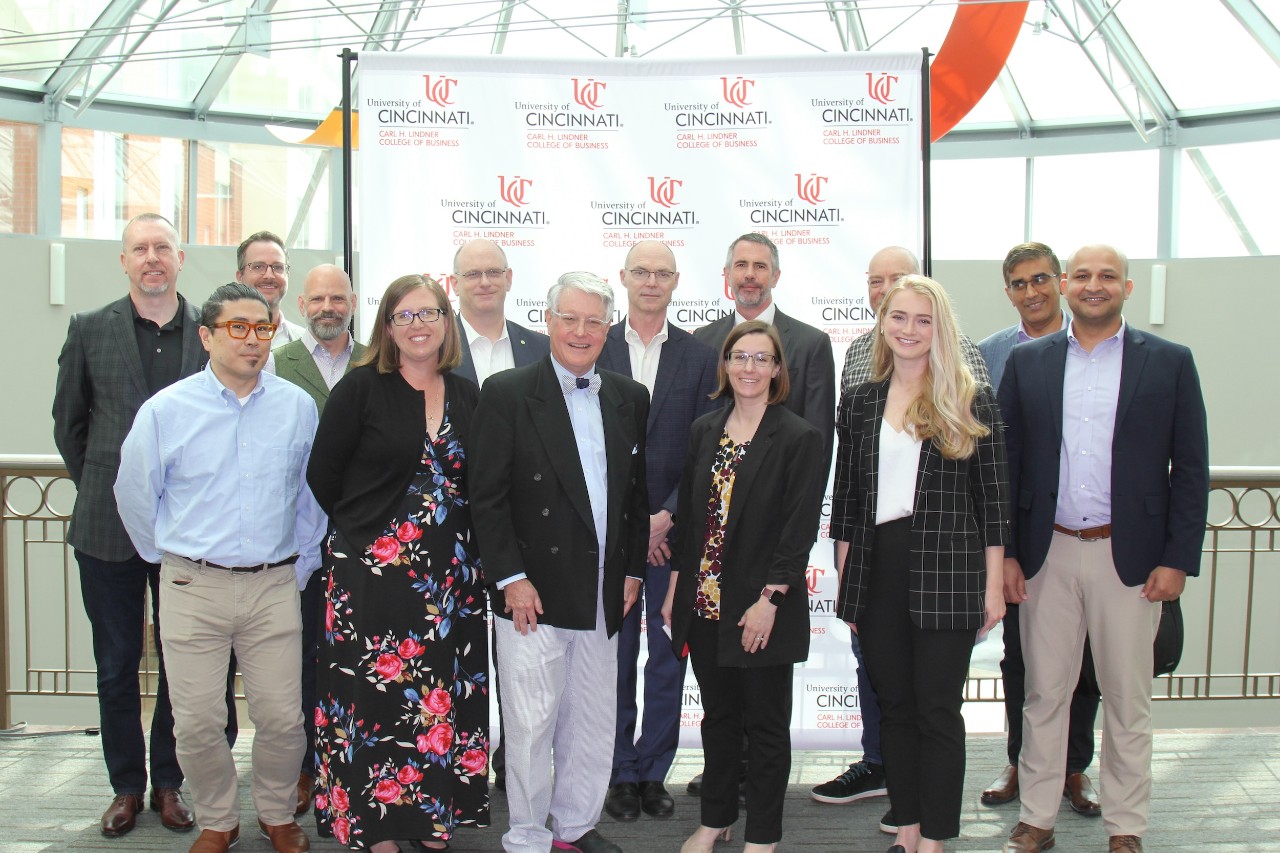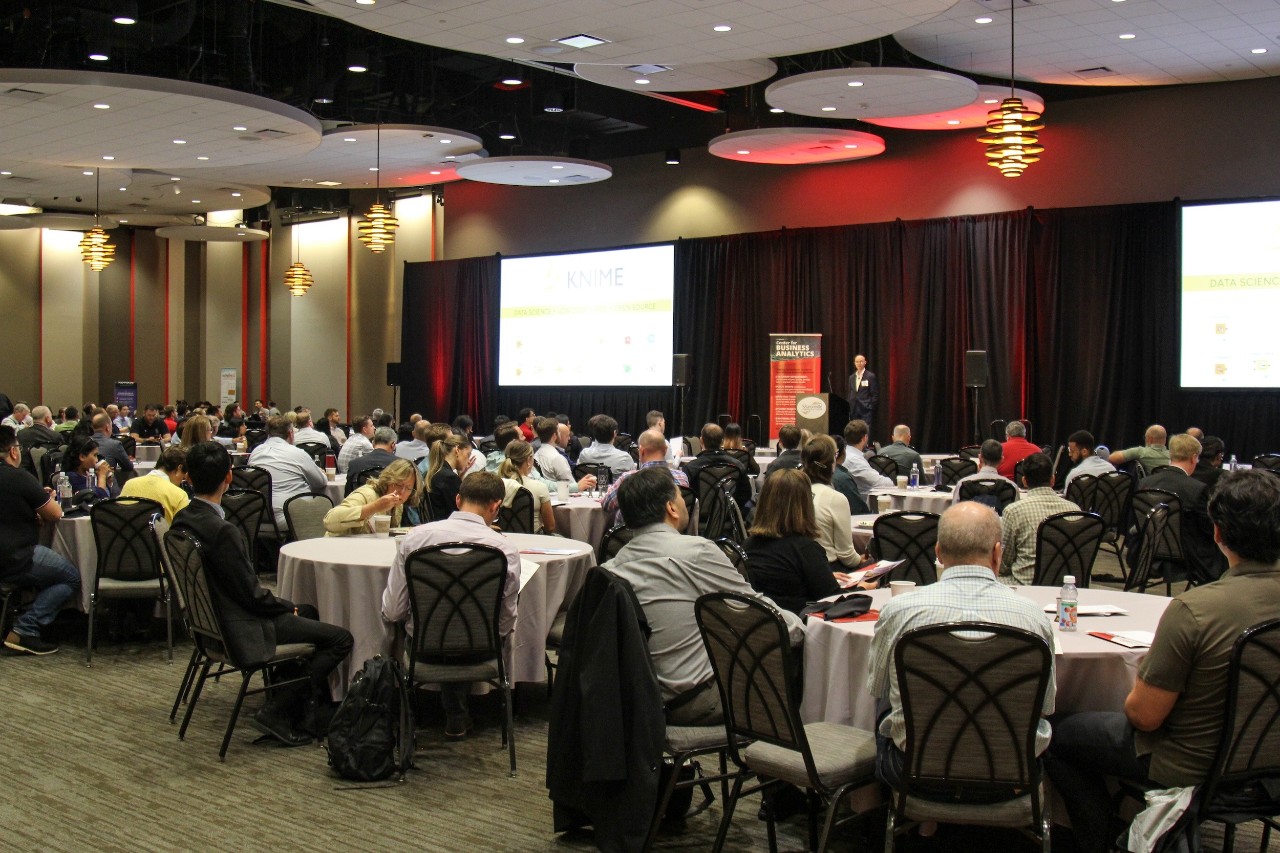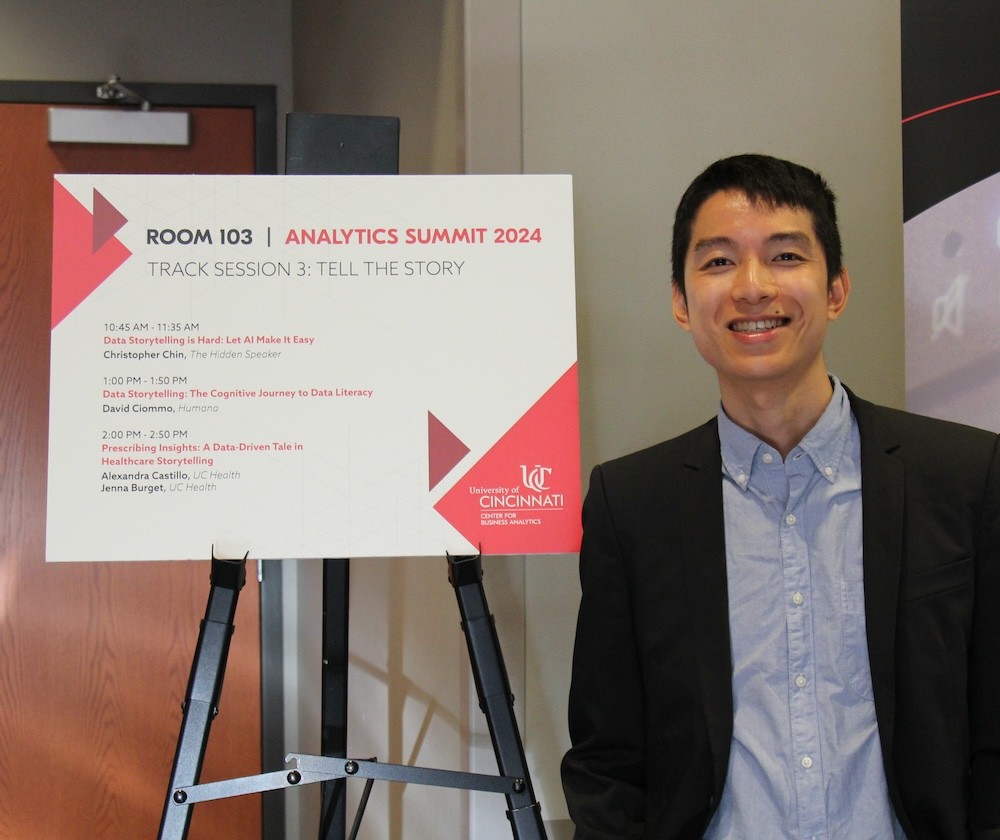
Cincinnati’s data science community makes interdisciplinary connections at 2024 Analytics Summit
Annual event ignites discourse around real-world applications of analytics
The University of Cincinnati Center for Business Analytics held its 12th annual Analytics Summit on April 30. More than 200 attendees convened at the Sharonville Convention Center eager to dive into this year’s theme: real-world applications of business analytics.
Housed in the Carl H. Lindner College of Business, the Center for Business Analytics serves the data science community through leadership development, public events such as the annual Analytics Summit and Data Science Symposium, a broad portfolio of training opportunities, consultation services and student engagement programs.

Center for Business Analytics Executive Director Tim Cholvat addresses the 2024 Analytics Summit attendees at the Sharonville Convention Center.
“Whether you’re a seasoned analytics professional or new on your analytics journey, I’m certain you’ll find a way to learn today,” said Tim Cholvat, executive director for the Center for Business Analytics, in his opening remarks.
The summit’s two keynote speakers and choice of 15 track sessions not only demonstrated real-world applications of analytics but the interdisciplinary implications of the field in everything from finance and leadership to health care and retail.

Thornton May, author of "The New Know: Innovation Powered by Analytics" solicited Analytics Summit attendees to respond to prompts throughout his opening keynote.
In his opening keynote, futurist and author Thornton May got attendees talking to one another in response to various prompts around the role of analytics in business and society. Prompts included brainstorming an artifact, movie, TV show, song or work of literature that comes closest to capturing the state of analytics today; misconceptions about analytics teams within organizations; and comparing and contrasting the state of analytics with pop star Taylor Swift.
“You have to migrate from delivering insight to igniting discourse,” May advised attendees on the role of data science across the enterprise.

Mike Fry, right, presented Glenn Wegryn, left, with an award recognizing and thanking him for his service to the Center for Business Analytics and the regional data science community.
Before releasing attendees to the morning breakout session, Mike Fry, PhD, managing director for the Center for Business Analytics and professor of operations, business analytics, and information systems, recognized two important individuals in attendance that day: Center for Business Analytics founder Jeff Camm, who is now senior associate dean of business analytics at Wake Forest University, and former Center for Business Analytics Executive Director Glenn Wegryn. Wegryn was presented with an award from the center expressing gratitude and appreciation for his years of service and transformative impact on the center.
The 15 tracks available were organized into five topics across three sessions. Topics were: “Leading the Way,” “The AI Revolution,” “Tell the Story,” “Data and Analytics Essentials in Industry,” and “Digital Transformation through Analytics.” Track speakers ranged from data scientists or technologists and business professionals positioned to use analytics to meet company objectives or communicate the value of analytics to company leadership.

"Tell the Story" track speaker Christopher Chin gave a live demo of relevant AI tools during his track session.
In “Data Storytelling is Hard: Let AI Make It Easy,” The Hidden Speaker’s Christopher Chin employed audience input for ChatGPT prompts, using results to then generate the text and images for a PowerPoint presentation in Marp. In his live demonstration, Chin brought to life the importance of framing data storytelling around the intended audience.
“Storytelling at its core is not about the data, it’s not even about the visualizations, it’s about the people on the other side, listening,” said Chin.
In “Can Generative AI Help Predict Asset Returns?” Lindner’s own Johnson Associate Professor of Finance Mehmet Sağlam, PhD, presented his research on the effectiveness and accuracy of generative AI tools in predicting asset returns in high frequency trading.
“We already had high frequency trading, but that was primarily on traditional price data,” said Saglam. “Now with generative AI, we can exploit much more vast amounts of data that is primarily text to generate new trading sequences.”

Richard Harknett, PhD, closed the event with a thought-provoking presentation on how all across the business enterprise are responsible for the role data plays in an organization.
Finally, closing keynote speaker Richard Harknett, PhD, wove many of the interdisciplinary learnings of the day together in speaking about governance, policy and ethics of AI. As professor of political science and director of the School of Public and International Affairs, co-director of the Ohio Cyber Range Institute and chair of UC’s Center for Cyber Strategy and Policy, Harknett was uniquely positioned to provide a broad view of the uneven regulation in AI today and talk about how it is not so much the code or data collection itself, but the role and responsibility of that data in the organization that makes an impact.
“We are not going to be able to deal with the scale, the speed and the flux of new technology if we continue to think about it as product or tool,” said Harknett. “We put standards on products, right? But we can’t do that with people. We set policies for opportunity with people in a different way."
Opening Keynote: "Analytics & Your Future"
- Thornton May, Futurist and Author at The Digital Value Institute
Closing Keynote: “Algorithmic Agency: Organizational Adaptation in a World of Fluidity”
- Richard Harknett, PhD, UC Ohio Cyber Range Institute
Track: Leading the Way
- "Towards an AI Future which is Responsible and Ethical" by Kelly Cohen, PhD, Brian H. Rowe Endowed Chair in Aerospace Engineering, UC College of Engineering and Applied Sciences.
- "Are You Smarter than an AI Model? Exploring Contents and Provenance of Generative AI Benchmarks" by Bill Nicholson, PhD, adjunct instructor, department of OBAIS.
- "Can Generative AI Help Predict Asset Returns?" by Mehmet Saglam, PhD, Johnson Associate Professor of Finance, department of finance.
Track: The AI Revolution
- "Predicting the Pulse of the World: Understand Culture with Generative AI & Predictive Analytics" by Michael Howard, CEO, Nichefire.
- "LLMs In a Low-Code Environment – Is it Possible?" by Satoru Hayasaka, Data Scientist, Knime.
- "The Future of AI: A Roadmap for Ethical and Accountable Artificial Intelligence" by Kristy Wedel, Senior Manager Data Science, Abbott.
Track: Tell the Story
- "Data Storytelling is Hard: Let AI Make It Easy" by Christopher Chin, Data Storytelling and Presentation Trainer, The Hidden Speaker.
- “Prescribing Insights: A Data-Driven Tale in Healthcare Storytelling” by Alexandra Castillo, Vice President and Chief Data and Analytics Officer, and Jenna Burget, Sr Business Intelligence Analyst, UC Health.
- "Data Storytelling: The Cognitive Journey to Data Literacy" by David Ciommo, Data Visualization Principal, Humana.
Track: Data and Analytics Essentials in Industry
- "Beyond the Buzz: Crafting a Business-Centric Analytics Strategy for True Digital Transformation Impact" by Dave Cherry, Executive Advisor, Cherry Advisory.
- "Proactive Data Quality Management and Observability for AI Success" by Nan Jararam: CEO and Founder, CoStategix & Jeremy Henry: Vice President of Technology, CoStrategix.
- Financial Panel, featuring Rob Golden, Great American Insurance Group, Rob Carnell, Huntington Bank, Shanna Anderson, Fifth Third Bank, Myra Chen, Capital Group.
Track: Digital Transformation Through Analytics
- "Machine Learning Applications in B2B Price/Revenue Optimization" by Vivek Anand, Pricing Analytics Expert.
- Kroger Analytics Evolution Through Tech and Talent" by Sarah Denman, Vice President, Data Science-Merchandising Analytics, 84.51.
- “Twinning Your Way to Sales Outreach Success: Amplifying Your Team's Voices with Generative AI” by Brandon Lee, CEO, Fistbump.
Premier Sponsors
- CoStrategix
- KNIME
Media Sponsor
- CDO Magazine
Tech Sponsor
- The Circuit
Featured Image at top: Twelve of the 22 speakers featured at the 2024 Analytics Summit, pictured with Center for Business Analytics Executive Director Tim Cholvat and Center for Business Analytics Managing Director Mike Fry, center. Photos/Suzanne Buzek.
About the UC Center for Business Analytics
The Center for Business Analytics unites organizations and a world-class, multidisciplinary group of faculty and students to educate and exchange ideas and best practices on applying analytical methods to enhance business performance. To inquire about membership, sponsorship, training or speaking opportunities, email UCBusAnalytics@ucmail.uc.edu.
Related Stories
UC Business Analytics director named INFORMS fellow
October 9, 2020
Glenn Wegryn, executive director for the Center for Business Analytics at the University of Cincinnati’s Carl H. Lindner College of business, has been named a fellow for The Institute for Operations Research and the Management Sciences (INFORMS), the largest international association of operations research and analytics professionals and students.
Cincinnati’s data science community makes interdisciplinary connections at 2024 Analytics Summit
May 7, 2024
The University of Cincinnati Center for Business Analytics held its 12th annual Analytics Summit on April 30. More than 200 attendees convened at the Sharonville Convention Center eager to dive into this year’s theme: real-world applications of business analytics.
Lindner MBA program names new director
August 15, 2023
The Carl H. Lindner College of Business has appointed a new academic director of MBA programs. Johnny Rungtusanatham, PhD — also an Ohio Eminent Scholar in Operations Management and Quantitative Analysis — will fill the role and serve as a professor of operations, business analytics, and information systems (OBAIS).
